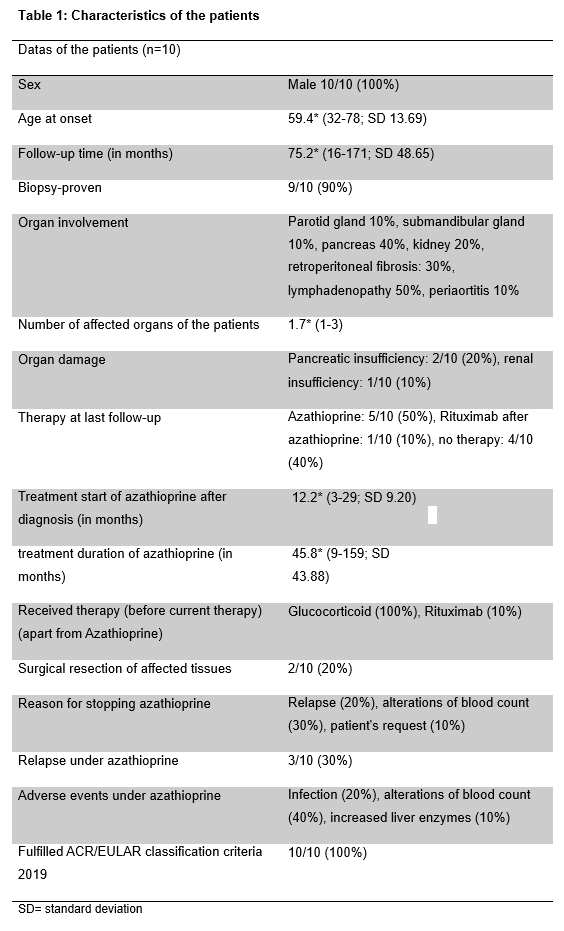Deutscher Rheumatologiekongress 2025
Deutscher Rheumatologiekongress 2025
Azathioprine as maintenance therapy for IgG4-related diseases: A retrospective case series
Text
Introduction: IgG4-related disease (IgG4-RD) is a rare autoimmune disease characterized by a progressive fibrosing course affecting a variety of organs and tissues. The clinical presentation varies widely depending on the organs affected [1]. Oral administration of glucocorticoids (GC) has been established as first-line treatment. However, 15–60% of patients experience relapse after GC therapy [2]. To reduce the risk of relapse and GC-associated side effects, GC-sparing therapy with DMARDs may be an option. The aim of this study is to investigate the efficacy of azathioprine in IgG4-RD.
Methods: This retrospective case series evaluates disease activity under azathioprine therapy in patients with IgG4-RD treated at the Medical University of Graz between 2006 and 2024. Patients with a confirmed IgG4-RD diagnosis (ACR/EULAR 2019) and current or previous azathioprine therapy after initial GC-therapy were included.
Results: Ten patients (100% male, mean age at disease onset: 59.4) with an average follow-up of 75.2 months were analysed. All patients fulfilled the ACR/EULAR classification criteria (see Table 1 [Tab. 1]). The main indications for initiating azathioprine therapy included disease relapse on GC (n=3), GC-related adverse effects (n=3) and the intention to reduce GC exposure (n=7). We observed a total of five relapses in three patients (30%) during azathioprine therapy. Reported adverse events associated with azathioprine included infections (n=2), haematological abnormalities (n=4) and elevated liver enzymes (n=1). Of note, all patients with renal involvement (n=2) relapsed on azathioprine therapy. At last follow-up, five patients (50%) were still receiving azathioprine. Two patients (20%) had been switched to rituximab after azathioprine therapy, with one of them already in remission and no longer receiving treatment. Three patients (30%) were no longer receiving immunosuppressive treatment (2 due to hematologic abnormalities, 1 due to patients request; no further therapy was initiated in all 3).
Table 1: Characteristics of the patients
Conclusion: Azathioprine is an appropriate maintenance therapy for IgG4-RD. In IgG4-RD with renal involvement other DMARDs such as rituximab may be a better option.
Literatur
[1] Wallace ZS, Naden RP, Chari S, Choi H, Della-Torre E, Dicaire JF, Hart PA, Inoue D, Kawano M, Khosroshahi A, Kubota K, Lanzillotta M, Okazaki K, Perugino CA, Sharma A, Saeki T, Sekiguchi H, Schleinitz N, Stone JR, Takahashi N, Umehara H, Webster G, Zen Y, Stone JH; American College of Rheumatology/European League Against Rheumatism IgG4-Related Disease Classification Criteria Working Group. The 2019 American College of Rheumatology/European League Against Rheumatism Classification Criteria for IgG4-Related Disease. Arthritis Rheumatol. 2020 Jan;72(1):7-19. DOI: 10.1002/art.41120[2] Kamisawa T, Funata N, Hayashi Y, Eishi Y, Koike M, Tsuruta K, Okamoto A, Egawa N, Nakajima H. A new clinicopathological entity of IgG4-related autoimmune disease. J Gastroenterol. 2003;38(10):982-4. DOI: 10.1007/s00535-003-1175-y




